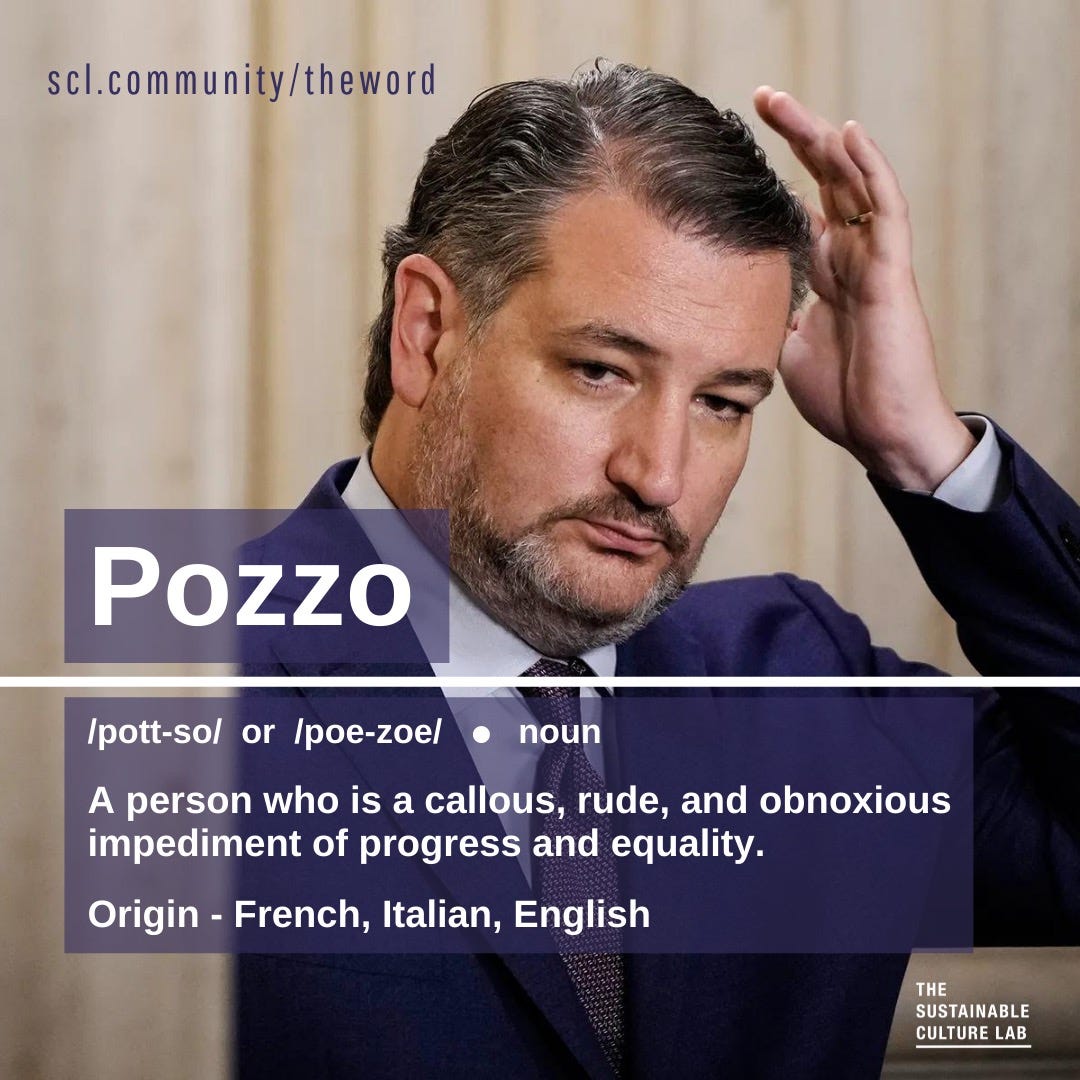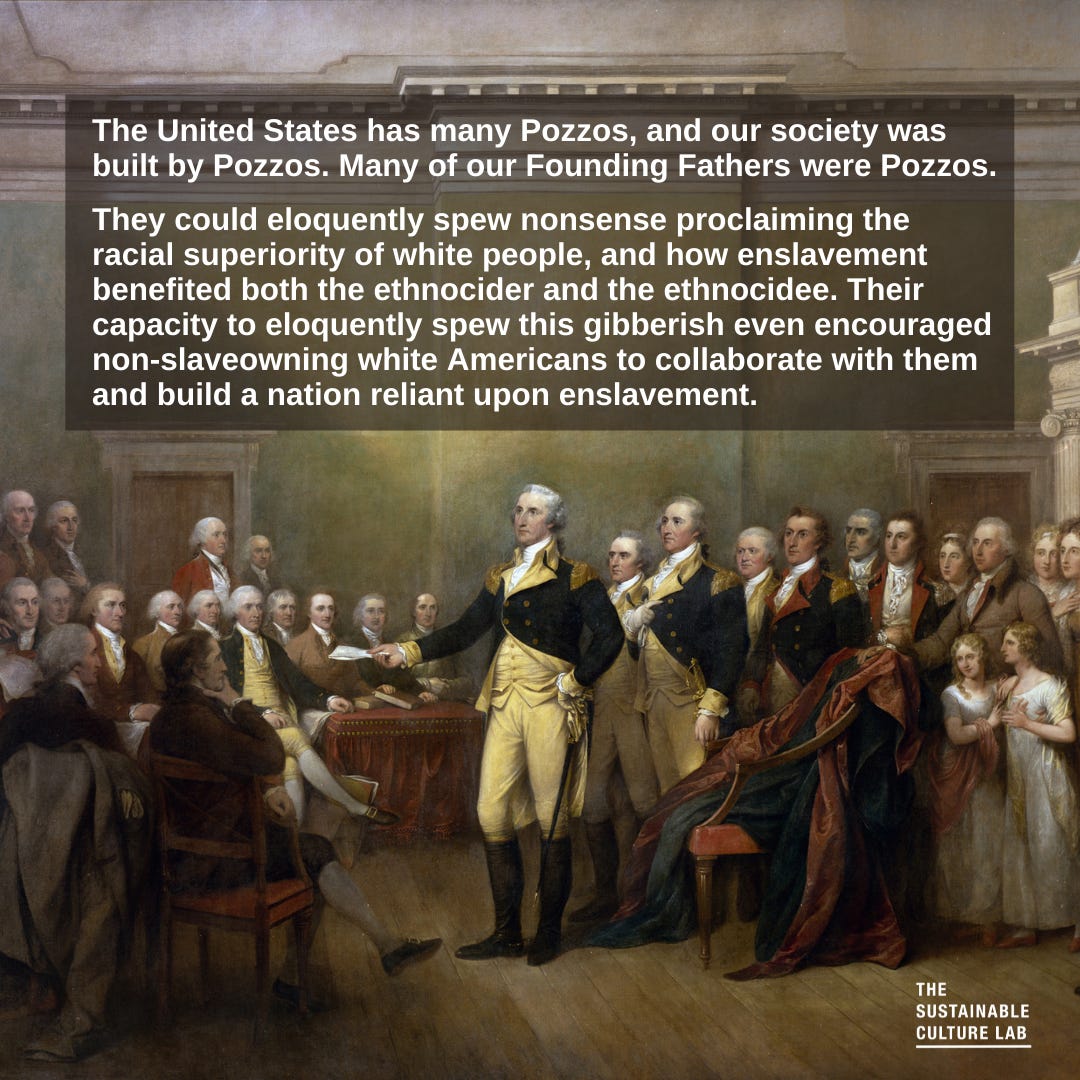Pozzo
Definition: a person who is a callous, rude, and obnoxious impediment of progress and equality
Origin: French, English
To help sustain and grow The Word with Barrett Holmes Pitner we have introduced a subscription option to the newsletter. Subscribers will allow us to continue producing The Word, and create exciting new content including podcasts and new newsletters.
Subscriptions start at $5 a month, and if you would like to give more you can sign up as a Founding Member and name your price.
We really enjoy bringing you The Word each week and we thank you for supporting our work.
My book THE CRIME WITHOUT A NAME was released on October 12, 2021 and NPR has picked it as one of the top books of the year!
You can order the book—including the audiobook—and watch recordings of my book tour discussions at Eaton and the New York Public Library at thecrimewithoutaname.com.
The play Waiting for Godot by Samuel Beckett is one of the most celebrated plays of the 20th century while also being largely misunderstood. The play’s lingering questions have remained unanswered for primarily two reasons: Beckett’s refusal to provide answers and a peculiar inclination by readers to disregard large swaths of the play.
Since the play does not follow a traditional theatrical narrative arc and the plot is primarily driven by two characters, Vladimir and Estragon, who merely wait for the titular Godot who never arrives, it has been described as “a play about nothing.” Yet this supposed nothingness actually equates to a vivid reflection of the modern world. For those who see the reflection, there is a natural desire to dissect the play and ask questions about the potential meaning of various moments in the play.
Beckett’s refusal to answer questions about the play means that not only have people been left on their own to decipher the play’s meaning, but that they have also been empowered to emphasize, overlook, and redefine various aspects of the play. The unguided curation of Waiting for Godot has resulted in the western world largely overlooking the two other significant characters in the play, Pozzo and Lucky, and the relative erasure of these characters is very telling and indicative of how an ethnocidal society can organically censor itself.
Pozzo is a slaveowner and Lucky is the enslaved person, yet analysis of Waiting for Godot often overlooks these two characters. Oppressive societies aspire to relegate their oppression to mere footnotes in history, and not recognize it as a foundational aspect of the society. Pozzo and Lucky are not footnotes, but strangely they are often treated as such.
Pozzo is a character we all need to be intimately aware of, not because of an affinity for Waiting for Godot, but because our society is filled with Pozzos and tragically we have grown accustomed to and have normalized their destructive relationship with the world and their fellow humans.
Pozzo is a Bozo
When Pozzo first arrives in the play, he introduces himself to Vladimir and Estragon, but they have a hard time understanding his name. Pozzo is not a common name, so at first they think his name is Bozzo. Pozzo does not like being called Bozzo, and he angrily yells at them that his name is Pozzo.
It is unclear why Beckett chose the name Pozzo, but since Beckett was Irish, I believe that the English word “bozo” must have influenced the name.
Since Beckett originally wrote the play in French, En Attendant Godot, the French pronunciation of Pozzo may have sounded more like the Italian pronunciation of pizza, “pitsa.” Pozzo would be a “potso” and his name would rhyme with “botso.” In Italian, the word “bozzo” means “bump” or “lump.” And if we are all tasked with simply waiting for Godot, then we can become human lumps as we do nothing but passively wait.
Yet the “zz” is not commonly used in French, so the English pronunciation could also apply and now Pozzo would rhyme with bozo and his name would be more indicative of a “stupid, rude, obnoxious, or annoying person.”
When I first read the play I assumed that Pozzo rhymed with “bozo,” and this pronunciation inclined me to not overlook the significance of Pozzo and Lucky because any play that essentially refers to a slaveowner as a bozo should resonate with a person of color.
For English-speakers, and especially American English-speakers, referring to Pozzo as “pozo” and not “potso” makes sense to me because this pronunciation both sounds more English and is indicative of his character.
Throughout the play, Pozzo demonstrates his stupidity through his commitment to dehumanizing Lucky while also tacitly acknowledging that his life remains dependent upon Lucky.
Lucky carries all of Pozzo’s valuables, and guides Pozzo through the world. When the audience first sees Pozzo and Lucky, we see Lucky first. He has a noose tied around his neck, and the rope is so long that it continues off stage. Eventually, Pozzo emerges as the person holding the other end of the rope and he appears to command Lucky where to go. At first glance, Pozzo appears to be in control, but his control only extends to Lucky yet Lucky takes the first steps into the world.
In Act I, Pozzo also tells Vladimir and Estragon that he intends to sell Lucky, but he never ends up selling him.
In Act II, Pozzo is now blind and Lucky has become his guide. As the play progresses, Pozzo has become increasingly dependent on Lucky, and now he needs Lucky’s eyes to see the world. Yet by this point Pozzo is literally incapable of seeing anything, so it is too late.
In Act I, Pozzo refused to see Lucky’s humanity since his way of life depended on dehumanizing Lucky, and by the end, he has become blinded to the world and is entirely dependent upon Lucky’s humanity in order to live.
Pozzo lives a sad, stupid, unsustainable life, and he’ll never be able see the tragedy of his own existence.
When he had sight he refused to see our shared humanity, and instead cultivated a vulgar, corrupted language that professed the inferiority of the person he has oppressed, and how a culture of oppression benefited both the oppressor and the oppressed.
Pozzo’s dangerous, delusional worldview depended on Lucky never being able to express his humanity nor speak his truth. At one point in the play, Vladimir and Estragon convince Pozzo to let Lucky speak, but once Lucky begins to talk Pozzo, Vladimir, and Estragon wrestle him to the ground. They collaborated in silencing his voice and suppressing his capacity to think.
Pozzo is a bozo, and by applying an English instead of an Italian pronunciation, I think we will become more inclined to not overlook the significance and dangerous stupidity of this character.
Don’t be a Pozzo
The United States has many Pozzos, and our society was built by Pozzos. Many of our Founding Fathers were Pozzos.
They could eloquently spew nonsense proclaiming racial superiority of white people, and how enslavement benefited both the ethnocider and the ethnocidee. Their capacity to eloquently spew this gibberish even encouraged non-slaveowning white Americans to collaborate with them and build a nation reliant upon enslavement
The three-fifths compromise and the Electoral College are both ideas that enriched and empowered America’s slaveowning Pozzos, and made them arguably the most powerful voices in the United States at the nation’s inception.
At this nation’s inception, Virginia and Pennsylvania had roughly the same amount of eligible white male voters, but Virginia dominated American politics because of slavery. Virginia had more members of the House of Representatives because of the three-fifths compromise, and the Electoral College meant that they had more presidential delegates.
Also, Washington, DC was selected as our nation’s capital because slavery was outlawed in New York City and Philadelphia. If an enslaved person resided in either state for a specific amount of time then they could obtain their freedom. Therefore, if an American president owned slaves and lived in either city, then the slaves that he brought with him had the potential to obtain their freedom. Placing our nation’s capital next to the pro-slavery South made it much easier for our presidential Pozzos to continue to enslave people.
America’s racists, both past and present, are most certainly Pozzos, but you can also be an American Pozzo without proudly proclaiming racist beliefs. Today’s Pozzos, more often than not, are Americans who embrace the ideas and rhetoric of the Pozzos of the past while also denying any racist beliefs or intent.
If someone claims that the Civil War was fought over state’s rights, that person is a Pozzo. If someone claims that the United States was not a racist nation at its inception and denies that many of our national norms exist to normalize racism and ethnocidal oppression, that person is a Pozzo.
These modern day American Pozzos are bad people, not because they are knowingly and intentionally doing something bad, but because they are attempting to corrupt and distort language and history so that themselves and others can be coerced into believing that something bad is instead, good.
In Waiting for Godot, Pozzo did a great job at articulating his belief that his enslavement and oppression of Lucky was a good act. His capacity to communicate with Vladimir and Estragon even succeeded in convincing these two actively passive people who lived to wait for Godot to also help him oppress Lucky and silence Lucky’s voice.
Not only do Pozzos impede progress and equality by getting in the way, but they also coerce others into supporting and empowering their destructive way of life.
And at least for me, when Pozzo rhymes with “bozo” it becomes harder to overlook Pozzo’s dangerous stupidity.
Pozzo wholeheartedly believes that he is doing something good, so his intent does not determine whether his actions are considered good or bad.
Today, there are many, many Americans who believe they are doing good as they defend slaveowners, Confederates, and governmental policies and social norms that Pozzos have erected that benefit predominately white Americans. This misguided intent crosses the political divide.
In addition to defending the Electoral College that has resulted in two Republicans becoming president since 2000 despite not winning the popular vote, American politicians in both parties still defend the filibuster despite it existing primarily as a tool for impeding the will of the people with a particular focus on bills that promote racial equality. It is not a coincidence that the filibuster was used a lot prior to the Civil War to impede the abolitionists movement, during Jim Crow to prevent the end of segregation, and during the presidency of Barack Obama, America’s first Black president.
America has many Pozzos because impeding progress and equality has long been socially acceptable and encouraged. America does not need more Pozzos. Don’t be a Pozzo.
Instead we must proactively embrace our shared humanity through cultivating cultural naissance, strengthen our Geist, grow our Geistgarten, and create Eǔtopian spaces.






